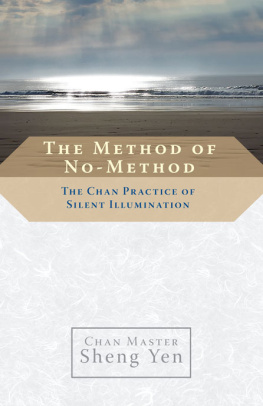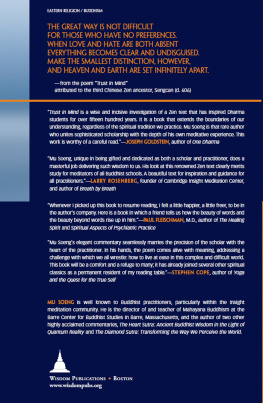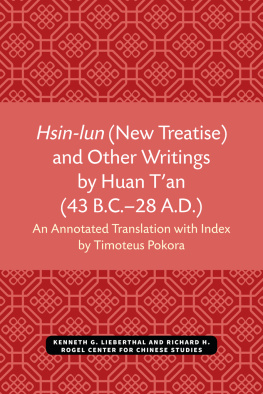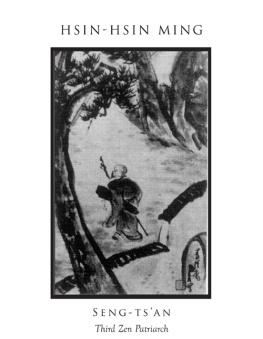ABOUT THE BOOK
The Supreme Way is not difficult
If only you do not pick and choose.
Neither love nor hate,
And you will clearly understand.
Be off by a hair,
And you are as far from it as heaven and earth.
These vivid lines begin one of the most beloved and commented upon of all Zen texts, the Hsin Hsin Ming (Faith in Mind), a sixth-century poem by the third Chan patriarch, Seng Tsan. The Hsin Hsin Ming is a masterpiece of economy, expressing the profoundest truth of the enlightened mind in only a few short pages. Master Sheng Yens approach is unique among commentaries on the text: he views it as a supremely useful and practical guide to meditation practice. I do not adopt a scholarly point of view or analytical approach, he says. Rather, I use the poem as a taking-off point to inspire the practitioner and deal with issues that arise during the course of practice. True faith in mind is the belief grounded in realization that we have a fundamental, unmoving, and unchanging mind. This mind is precisely Buddha mind.
CHAN MASTER SHENG YEN (19302009) was a widely respected Taiwanese Chan (Chinese Zen) master who taught extensively in the West during the last thirty-one years of his life, with twenty-one centers throughout North America, as well as dozens of others throughout the world. He co-led retreats with the Dalai Lama, and he is the author of numerous books in Chinese and English, including Song of Mind, The Method of No-Method, and his autobiography, Footprints in the Snow.
Sign up to learn more about our books and receive special offers from Shambhala Publications.

Or visit us online to sign up at shambhala.com/eshambhala.
FAITH IN MIND
A Commentary on Seng Tsans Classic

Chan Master Sheng Yen

Shambhala
Boston & London
2013
Shambhala Publications, Inc.
Horticultural Hall
300 Massachusetts Avenue
Boston, Massachusetts 02115
www.shambhala.com
Cover design by Jim Zaccaria
1987 by Dharma Drum Publications
All rights reserved. No part of this book may be reproduced in any form or by any means, electronic or mechanical, including photocopying, recording, or by any information storage and retrieval system, without permission in writing from the publisher.
Editor: Karen Zinn; Editorial Assistance: Richard Heau, Richard Kent, Alan Rubinstein; Translator: Master Sheng Yen; Co-Translator: Paul Kennedy; Interpreter (retreat lectures): Dan Stevenson, Ming-Yee Wang, Karen Zinn; Transcriber: Dorothy Weiner; Calligraphy: Master Sheng Yen; Illustration: Cliff Selover
Library of Congress Cataloging-in-Publication Data
Shengyan, 1930
Faith in mind: a commentary on Seng Tsans classic / Chan Master Sheng Yen.
p. cm.
Originally published: Elmhurst, N.Y.: Faith in mind: a guide to Chan practice, 1987.
eISBN 978-0-8348-2617-5
ISBN 978-1-59030-397-9 (alk. paper)
1. Spiritual lifeZen Buddhism. 2. MeditationZen Buddhism. 3. Zen Buddhism. 4. Sengcan, d. 606. Xin xin ming. I. Title. II. Title: Commentary on Seng Tsans classic.
BQ9288.S516 2006
294.3444dc22
2006045043
Contents
In the records of Chan masters, there is no full account of the life of Seng Tsan, the Third Patriarch, who died in A.D. 606. He is mentioned, however, in the Tang dynasty (618907) Kao Seng Chua (Biographies of Eminent Monks) written by master Fa Tsung; After Chan master (Hui) Ko, there was Chan master (Seng) Tsan. The Leng Chieh Shih Tzu Chi (Records of the Masters of the Lankavatara Sutra), which contains early historical material of the Chan school, says that after entering retreat in the mountains Seng Tsan never emerged, nor did he ever write about or transmit the Dharma. This statement is problematic considering that the Sui dynasty history in Er Shih Wu Shih (The Twenty-five History Books) states that it 592 he transmitted the Dharma to Tao Hsin (580651), the Fourth Patriarch. It also calls into question the authorship of the poem Faith in Mind, which has historically been attributed to Seng Tsan. Contemporary scholars doubt whether he was, in fact, the author. Niu Tou Fa Jung (594657), a disciple of Tao Hsin, wrote a poem entitled Song of Mind. Noticing the similarity between the two poems, some suggest that Faith in Mind was actually written after the time of the Sixth Patriarch, Hui Neng (638713), as an improved, condensed version of Song of Mind. The thought expressed in Faith in Mind is indeed better organized, more concise and seems complete compared to Niu Tous poem.
The question of attribution, however, has no relevance to my commentaries on Faith in Mind. The importance of the poem to us lies in its value as a guide to Chan meditation, and its significance in the history of Chan (Zen), both in China and Japan. Among the many poems on enlightenment, the most highly regarded are Yung Chias (665713) Song of Enlightenment and Faith in Mind, because of the clear guidance they provide on the method of Chan.
For this reason, I do not comment on Faith in Mind on ordinary occasions. I choose to lecture on it only during the seven-day Chan retreat. The twenty chapters of this book are based on translated lectures spanning four retreats, subsequently edited for publication. Since the talks were given within the context of intensive meditation practice, I did not adopt a scholarly point of view or analytical approach. It is not a formal commentary on the text; rather, I use the poem as a taking-off point to inspire the practitioner and deal with certain issues that arise during the course of practice.
There are at least five published English translations of Faith in Mind. All have their merits. I offer a new translation which is similar in many respects to previous ones; however, portions of it are quite different, reflecting my own understanding of the poem.
When commenting on Faith in Mind, I often say to my students, Now that you are practicing, it matters little whether or not I speak on Faith in Mind. But I am using the poem to instruct you on the method of practice. The progress and condition of a given group of practitioners differs from day to day and from retreat to retreat. Thus I adapt my discussion of the poem to the situation at hand, while remaining within the scope of the text. I believe these talks can serve as a helpful guide both to the aspiring and experienced practitioner. It has also helped me personally, by giving me new insights into the poem as various situations arose.
The phrase faith in mind contains the two meanings of believing in and realizing the mind. Mind is especially emphasized in Chan. True faith in mind is the belief grounded in realization that we have a fundamental, unmoving, unchanging mind. This mind is precisely Buddha mind; it is also Tathagatagarbha (womb of Tathagata) in every sentient being. But the mind experienced by ordinary beings in the midst of vexations is deluded mind, not true mind. Those who seek to rid themselves of vexations imagine that there is a true mind to attain. However, from the perspective of Buddha mind, there is only one mind, neither true nor false. There is no need to discriminate, for everything, everywhere, is mind everlasting. When we fully realize Buddha mind, the believing mind and the mind which is believed in merge into one; since they are the same, the need for mere belief in this mind disappears.
Next page








